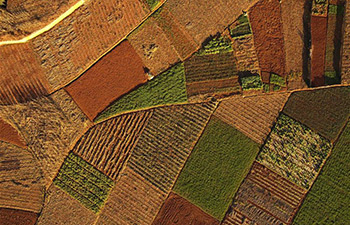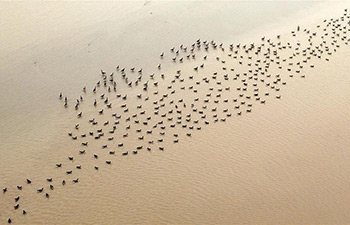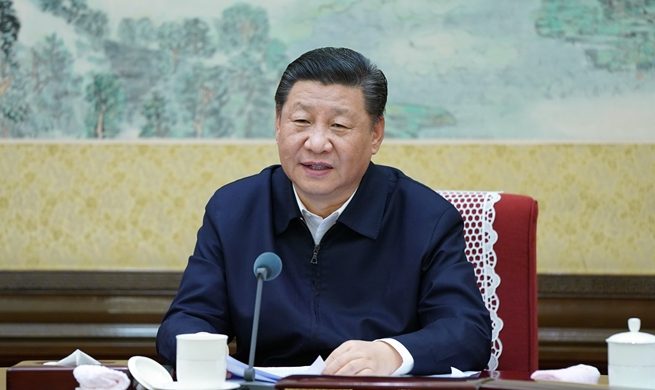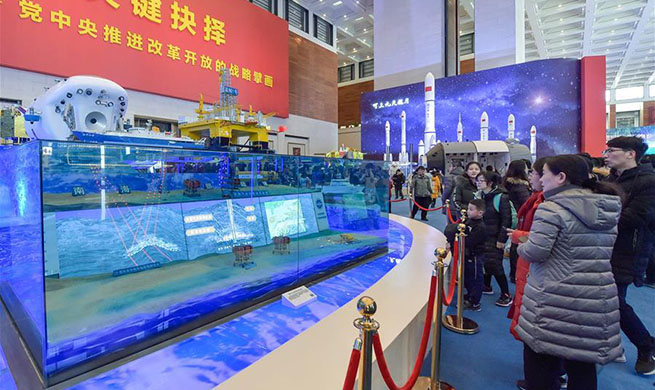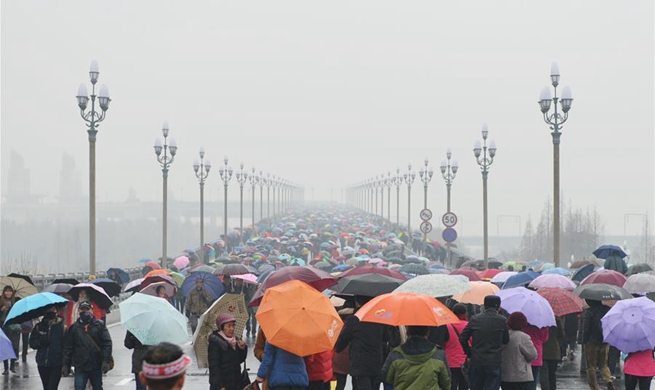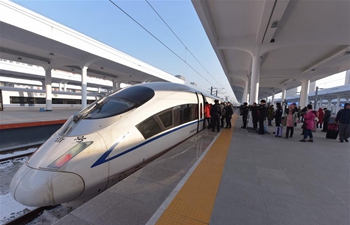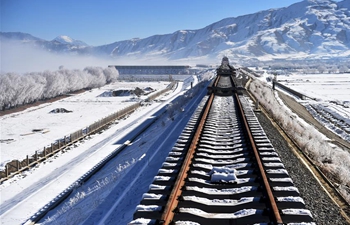by Mahmoud Fouly
CAIRO, Dec. 26 (Xinhua) -- As the New Year 2019 is approaching, Egypt sees evident improvement in the country's security and economic conditions after years of turmoil and recession following two popular uprisings that toppled two heads of state in 2011 and 2013.
The Egyptian army and police have been launching security campaigns against terrorists in the restive northern part of the Sinai Peninsula and other regions nationwide, while the government has been adopting a strict three-year economic reform plan that has put the country's economy back on track.
SECURITY PROGRESS
On Sunday, the Egyptian police announced the killing of 14 terrorists in Arish city of North Sinai province northeastern the country.
The operation is part of an anti-terror war declared by Egyptian President Abdel-Fattah al-Sisi, the army chief then, following the popular-backed military ouster of former Muslim Brotherhood-oriented President Mohamed Morsi in early July 2013.
Most of the terror attacks in Egypt in the past few years were claimed by a Sinai-based group loyal to the Islamic State (IS) regional terrorist group.
An IS-claimed Russian plane crash in Sinai killed over 200 Russians in October, 2015 and a tragic fall of an EgyptAir flight in May, 2016 killed all 66 people onboard including 15 French.
Meanwhile, the Egyptian army and police killed hundreds of terrorists and arrested thousands of suspects during the country's anti-terror war declared following Morsi's ouster.
As a result, the situation has become different now, for security conditions have significantly improved and the recurrence of terrorist attacks has greatly declined whether in Sinai, the capital Cairo or other provinces across the country.
Egypt has also been working hard on improving airport security, gradually leading several states to resume direct flights with Cairo after years of suspension over security concerns.
Moscow has already resumed direct flights to Cairo in April while flights to other Egyptian cities, including the popular Red Sea resorts of Sharm El-Sheikh and Hurghada, will be resumed "soon," according to Russian President Vladimir Putin following talks with his Egyptian counterpart Sisi in Russia's Sochi in October.
Earlier in December, the United States decided to resume commercial flights with Egypt starting from January 2019. The decision came more than three years after Washington suspended cargo flights coming from Egypt in November 2015, a few days after the deadly Russian plane crash.
The declining terrorist activities, the tight security measures and the resumption of some foreign flights reflect the progress of security conditions in the most populous Arab state, which in turn has given a push to the tourism sector that has been ailing for years over security issues.
In the first half of 2018, about 5 million tourists visited the monument-rich country, compared to 8.3 million in the whole year of 2017 and 5.3 million tourists in 2016.
ECONOMIC IMPROVEMENT
In late 2016, the Egyptian government started to liberalize the exchange rate of its local currency, the Egyptian pound, to contain shortage of U.S. dollars as an initial step of an economic reform program based on strict austerity measures, tax hikes and subsidy cuts.
Egypt's reform plan is encouraged by the International Monetary Fund (IMF), which offered the Arab country a 12-billion-dollar loan to support the reform, two-thirds of which has already been delivered. Egypt expects a tranche of 2 billion dollars from the IMF loan within weeks.
Despite the consequent price hikes and inflation rise, world financial institutions and research centers commended Egypt's reform steps and expected fruitful results in the near future.
A report released in early May by the Center for International Development (CID) at Harvard University ranked Egypt as the world's third fastest growing economy in the coming decade after India and Uganda.
Egypt achieved a high growth of 5.3 percent in the 2017-18 fiscal year. The IMF report even expected Egypt's growth to further accelerate to reach 5.5 percent in the ongoing 2018-19 fiscal year.
Egypt's fiscal year runs from beginning of July to end of June.
In September, IMF managing director Christine Lagarde said following a meeting with Sisi in New York that the Egyptian economy is showing "strong signs of recovery" and that the country's economic growth is among the highest in the Middle East.
Lagarde underscored the importance of Egypt's structural reforms to achieve more sustainable growth.
"These reforms will help achieve more sustainable, inclusive and private-sector led growth which will help create jobs for Egypt's young population, while also ensuring adequate resources are available for social protection," she added.
In October, the World Bank agreed a 3-billion-dollar financing deal with Egypt, whose investment ministry said would help secure economic growth.
Last week, the Egyptian president met in Vienna with World Bank chief Kristalina Georgieva, who highlighted the "positive results" of the economic reform measures implemented by the Egyptian government, including macroeconomic stability, rising growth rates and declining budget deficit.
The World Bank currently has 16 projects in Egypt worth 6.69 billion dollars in total, which reflects confidence of the world's top financial institution in the future of the Egyptian economy.
Egypt's economic improvement is seen in the mega projects being carried out in the country, whether in the fields of infrastructure, industry or energy, involving big world companies.
Germany's Siemens and its consortium partners, the two Egyptian giants Orascom Construction and Elsewedy Electric, celebrated in July the completion of the combined cycle power plants in Egypt.
The three stations, located in the under-construction administrative capital city eastern Cairo and the two provinces of Beni Suef and Kafr el-Sheikh, will add a total of 14.4 gigawatts of power generation capacity to Egypt's national grid, which is enough power to supply up to 40 million people with reliable electricity.
Likewise, Chinese large corporations are currently working on a number of energy mega projects in Egypt, including Sinohydro, Dongfang Electric, Shanghai Electric, State Grid Corporation of China, Huawei and others.
Dongfang Electric and Shanghai Electric corporations are building a coal-fired power plant in Hamrawein region on the Red Sea coast with a total generating capacity of 6,000 megawatts. The plant, which will be constructed in six years, is expected to be the largest of its kind in the Middle East region.
"We're also working with China's Sinohydro on the construction of a major pumped-storage hydropower plant in Mount Ataka in Suez province northeastern Egypt with a capacity of 2,400 megawatts, besides our cooperation with State Grid Corporation of China and Huawei," Mohamed Mousa, a senior undersecretary at Egypt's Ministry of Electricity and Renewable Energy, told Xinhua in November.
In the field of industry, Chinese industrial developer Tianjin Economic-Technological Development Area (TEDA) is currently developing a total area of 7.23 square km in Egypt's Suez Canal Economic Zone (SCZone) in Ain Sokhna district of Suez province east of Cairo.
TEDA attracted many enterprises to the SCZone, including China's fiberglass giant manufacturer Jushi, which helped Egypt become one of the largest fiberglass producers and exporters in the world over the past couple of years.
Egypt's economic progress is also reflected in the annual rise of the country's non-oil exports, which hit about 18.58 billion dollars from January to October 2018 compared to 17.4 billion dollars in the same period last year, marking a 6.7-percent increase.


